| | | | | | | | | | | Axios World | | By Dave Lawler ·Mar 24, 2022 | | Welcome back to Axios World. - Thanks to my brilliant Axios colleagues for contributing most of tonight's edition (1,885 words, 7 minutes) while I was working on the third episode of our podcast on Putin's invasion, which will be out on Monday AM.
- Happy 1st birthday to Axios Latino! Sign up here for the twice-weekly newsletter and join the team on Twitter Spaces this Friday for a conversation about the political allegiances of U.S. Latinos.
Situational awareness, from the world of soccer: North Macedonia just knocked defending European champions Italy out of World Cup qualifying with a shocking 1-0 win. | | | | | | 1 big thing: Biden's unlikely embrace of Poland | 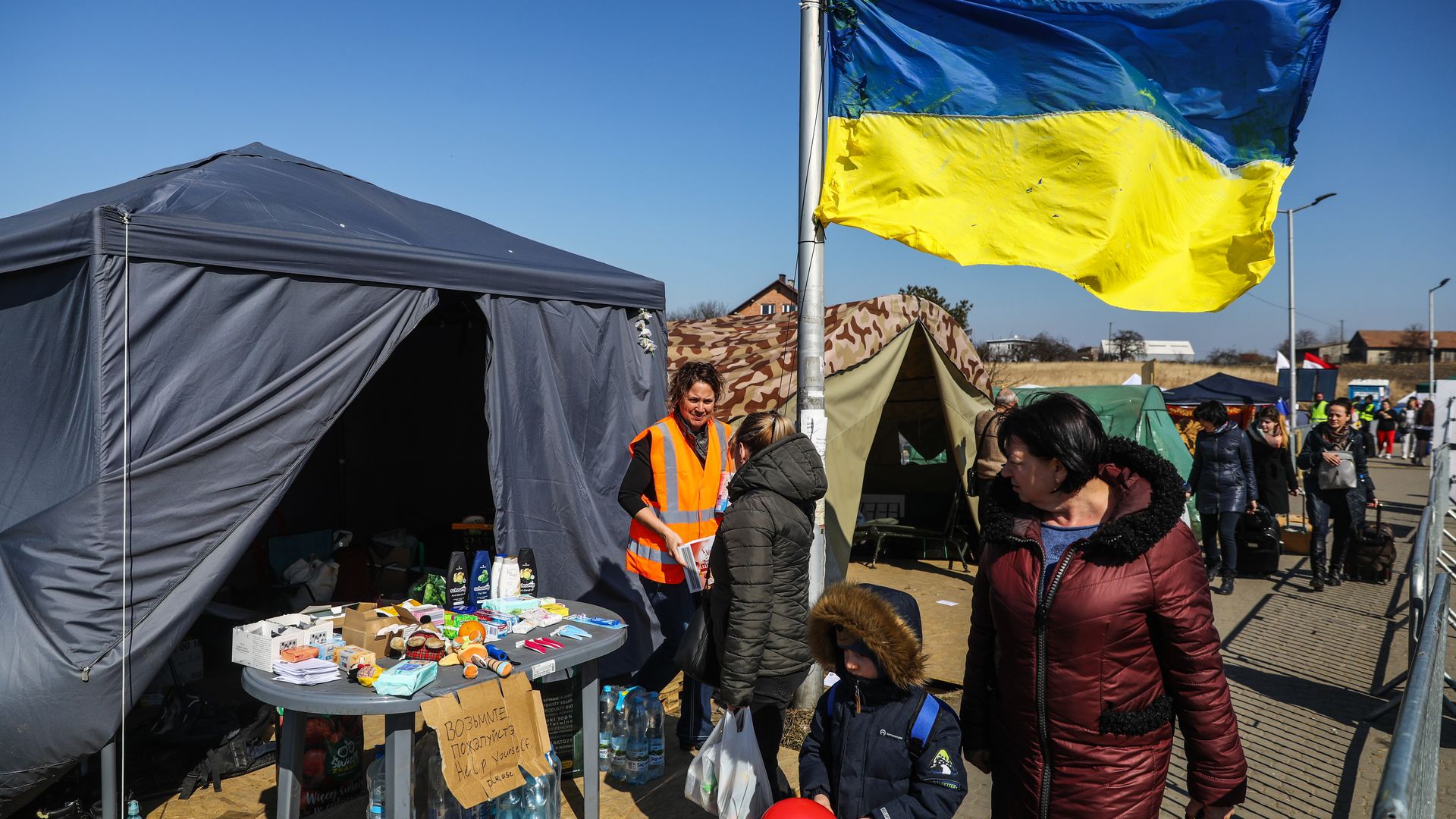 | | | Ukrainian refugees cross the border into Poland. Photo: Beata Zawrzel/NurPhoto via Getty | | | | President Biden's visit to Poland on Friday will punctuate the country's unlikely turn from illiberal agitator to symbol of European solidarity, putting on hold U.S. and EU concerns about Warsaw's democratic backsliding to celebrate its embrace of over 2 million Ukrainian refugees, Axios' Zach Basu and Sarah Mucha report. The big picture: In October 2020, Biden described Poland in the same breath as Hungary and Belarus while warning about the "rise of totalitarian regimes." Today, Poland is leading the West in calling for maximalist support for Ukraine as its democracy threatens to be crushed by Vladimir Putin. Background: Poland's ruling Law and Justice (PiS) party has been clashing with the EU ever since coming to power in 2015, when it began pursuing a right-wing agenda that Brussels claims has violated its rule-of-law standards. - Amid the long-running dispute with Brussels, Poland's leaders found a friend in Donald Trump, who met with President Andrzej Duda at least five times during his presidency.
- The EU has for months now withheld billions of dollars in pandemic recovery funds over Poland's crackdown on judicial independence, prompting the leader of PiS to accuse Germany in December of seeking to turn EU into a "German fourth reich."
Flash forward: The EU's judicial dispute with Poland hasn't ended, but European leaders are searching for a resolution that would unlock the funds and help Warsaw manage the flood of Ukrainian refugees entering the country. - Stephen Mull, a former U.S. ambassador to Poland, tells Axios that concerns about democratic backsliding haven't gone away, but that right now "there's a house on fire right next door."
Between the lines: Even before the Ukraine crisis eclipsed domestic issues, Duda had taken a number of steps to push Polish politics back to the center and halt the country's drift toward isolation, says Daniel Fried, another former ambassador to Poland. - In December, for example, Duda vetoed a controversial media law condemned by the U.S. for appearing to target an American-owned news station often critical of the government.
- He has also proposed a compromise to end the EU courts dispute, and earlier this month, he vetoed a law that would have restricted teaching on LGBT and reproductive rights in schools, saying "we don't need more conflicts."
The other side: Opposition leaders and critics inside the EU argue that Duda's moderation is a smokescreen and that the West should continue to hold Poland accountable for its democratic backsliding ahead of next year's elections. - PiS "conducts international policy for the purpose of national policy," Wojciech Olejniczak, a Polish member of the European Parliament, tells Axios.
- That means they'll embrace a popular cause like solidarity with Ukraine while continuing to conduct populist policy within the country, Olejniczak argues.
State of play: Polish society — not just Polish politics — has fully mobilized behind Ukraine. - Ukrainians are permitted to travel on the state-run railway system for free and have been granted access to health care, education and other benefits.
- Few refugee camps exist because so many Polish families have welcomed Ukrainians into their homes, including traditionally anti-immigrant government officials.
What they're saying: "It's this Polish national consensus and you basically have the whole society organizing itself to help people," said Fried, who spoke to Axios while returning from a visit to Warsaw. - "And when you ask them why, they'll look at you and say, 'Because that was us,'" Fried said, referring to Poland's history under Nazi and Soviet occupation.
|     | | | | | | 2. Interview: Zelensky's right-hand man says peace talks progressing | 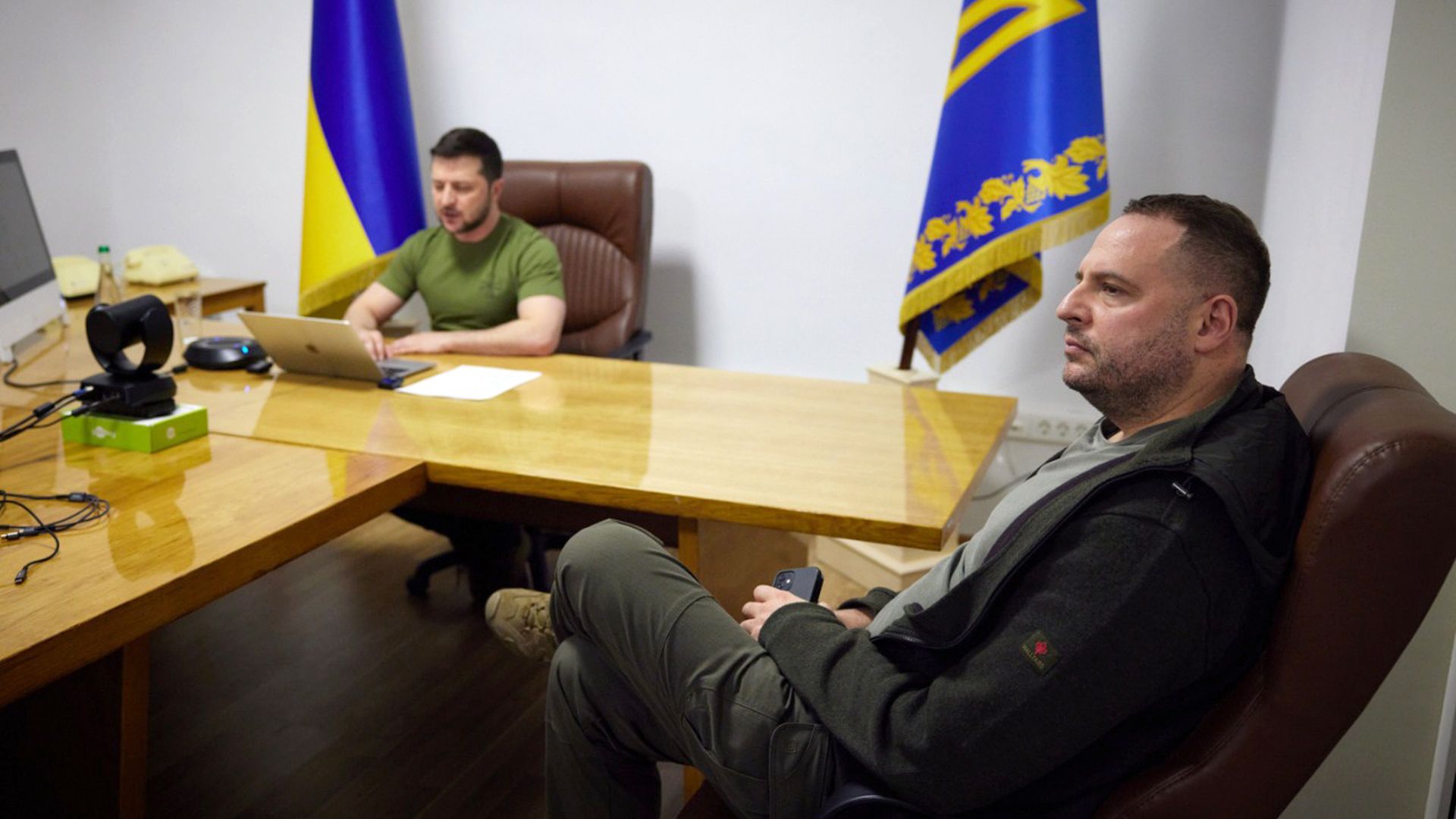 | | | Volodymyr Zelensky and Andriy Yermak (right) are pictured during the Ukrainian president's address to the U.S. Congress, from Kyiv, Ukraine. Photo: Ukrinform/Future Publishing via Getty Images | | | | Ceasefire negotiations are showing progress, Andriy Yermak, Ukrainian President Volodymyr Zelensky's chief of staff, told Axios' Barak Ravid Thursday in a joint Zoom interview with three other reporters. State of play: Yermak said the talks with Russia were difficult at first, with Russian officials speaking in ultimatums. But as the weeks passed, a real dialogue started. - "We have cautious optimism. The negotiations are ongoing, and there are things we think we can agree on. The most important things for us are stopping the war, withdrawing all Russian forces and creating a new security framework for Ukraine," he added.
The other side: Putin has so far refused to meet directly with Zelensky. Moscow has demanded that Ukraine declare neutrality, rule out future NATO membership, and give up all claims to Crimea and the Donbas "republics." Yermak made it clear several times during the interview that Ukraine will not agree to any territorial concessions in Crimea or the eastern Donbas region. - "We are not going to give anything that is ours. People who were at war for 30 days won't allow this to happen. We don't want 1 meter of Russian territory. We just want our territory back," he added.
- Between the lines: The clear red lines the two sides have drawn on this issue do not intersect.
Behind the scenes: Yermak said Zelensky sleeps four to five hours every night and holds calls with about 10 foreign leaders each morning before meeting government ministers, military commanders, and heads of the intelligence and security services. - Recently, Zelensky has given a speech almost every day to different countries' legislative bodies. On Thursday, he addressed the NATO summit via video link.
- "I was at the office at 6am the day the first missiles were fired," Yermak said.
- "The president was already there when I arrived. Since then, we haven't left. The president works 20 hours a day, but stays focused and energetic. During the last months, I haven't seen the president lose his cool or [be] scared."
Go deeper: Yermak said Ukraine wants more support from Israel. |     | | | | | | 3. Allies hit Russia as Biden visits Brussels | 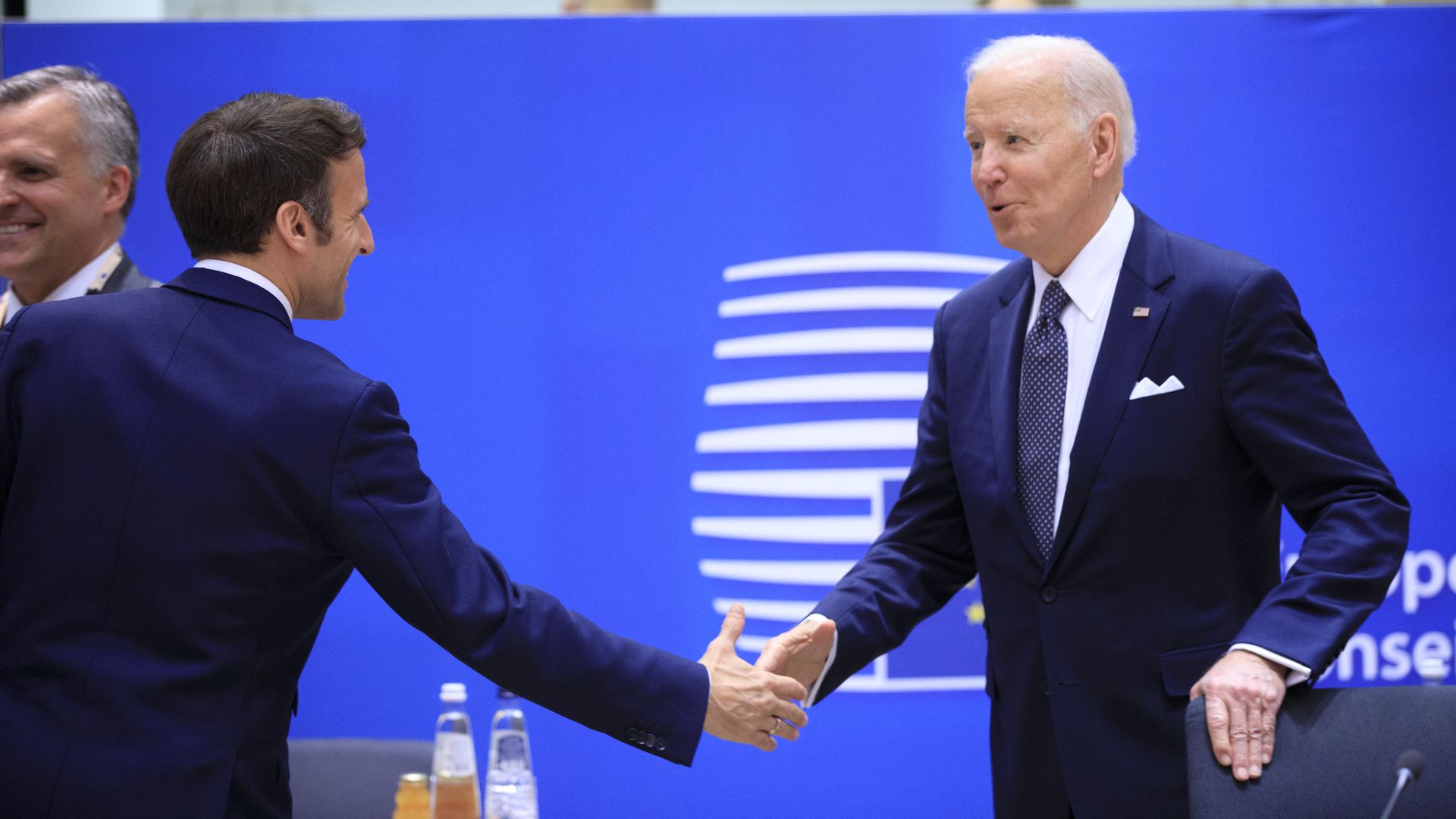 | | | President Biden greets President Macron. Photo: Thierry Monasse/Getty Images | | | | Exactly one month since Russia began its invasion of Ukraine, the leaders of NATO, the G7 and the European Union have convened a trio of summits in Brussels to coordinate the next phase of the Western response, Zach writes. - Ukrainian President Volodymyr Zelensky addressed the NATO summit via video link, telling the alliance: "Never, please, never tell us again that our army does not meet NATO standards.
- The NATO allies said Secretary-General Jens Stoltenberg will stay on for a year past his term, which was set to expire in September, to maintain stability during the crisis in Ukraine. NATO will also double its military presence on its eastern flank.
- The U.S., U.K., EU and G7 all announced new sanctions or enforcement measures.
- Biden held a press conference in which he expressed support for expelling Russia from the G20 and said NATO "would respond" if Russia used chemical weapons inside Ukraine (Highlights).
- G7 leaders pledged to "actively support countries willing to phase out their dependency" on Russian energy, as well as those harmed by the collateral effect of sanctions and global food insecurity.
What to watch: The U.S. and EU are close to a deal on supplying American liquefied natural gas to help European countries like Germany wean themselves off Russian energy. Worth noting: While Russia dominated the discussions in Brussels, NATO leaders also called on China to "cease amplifying the Kremlin's false narratives" and "promote a peaceful resolution to the conflict." |     | | | | | | A message from Axios | | Recruit top talent with Axios | | |  | | | | Axios now has job boards in the fastest growing cities in America. Reach smart professionals that use Axios daily to make decisions about where to work, what to do and where to live. Post your job opening on Axios | | | | | | 4. Data du jour: Where U.S. troops are stationed in Europe |  Data: U.S. European Command; Chart: Danielle Alberti/Axios The number of U.S. troops stationed in Europe peaked at around 340,000 in 1987, bottomed out at around 65,000 in 2018, and is now back over 100,000. View the interactive map. |     | | | | | | 5. French election highlights the weakness of the left | | Clockwise from top left: Emmanuel Macron, Anne Hidalgo, Yannick Jadot and Jean-Luc Mélenchon. Photos: Antoine Gyori/Corbis via Getty Images, Chesnot/Getty Images, Stephane De Sakutin/AFP via Getty Images and Chesnot/Getty Images With less than three weeks until the first round of voting in the French presidential election, the once-dominant left is hardly a factor, Axios' Ivana Saric writes. Driving the news: While far-left candidate Jean-Luc Mélenchon is in third place with 13% in Politico's latest poll of polls, he lags behind far-right contender Marine Le Pen (18%) and far behind centrist President Emmanuel Macron (29%). Other left-leaning candidates fare far worse. - Greens candidate Yannick Jadot polls at 5% while Paris Mayor Anne Hidalgo has just 2% despite representing what was until recently one of France's two major parties, the Socialists.
State of play: France's traditional center-left party, the Socialists, "completely imploded" with the unpopular presidency of Macron's predecessor François Hollande, according to Benjamin Haddad, senior director of the Atlantic Council's Europe Center. - Macron saw the writing on the wall for Hollande, his former boss, and was able to create a broad centrist coalition, absorbing many Socialist voters.
- Meanwhile, French politics were shifting to the right. As issues like immigration and identity came to the forefront, the left was divided between those wanting to maintain France's traditional universalist ideals and those echoing progressives in the U.S. by focusing on social justice issues, Célia Belin of the Brookings Institution told Axios.
The nationalistic right was offering "extremely straightforward" responses to the changes in society, "a bit like the Brexiteers before Brexit," Belin said. - Meanwhile, leftist candidates like Hidalgo and Jadot are perceived as representing "Parisian yuppies," Belin said.
What's next: Macron appears likely to win a large portion of the center-left vote and hold onto the presidency for five more years, but it's unclear whether a successor would be able to keep his centrist coalition together. - This leaves an opening for the Socialists and the Greens, but "they will have to figure out a way to work together or they're both done," Belin says.
|     | | | | | | 6. Remembering Madeleine Albright (1937–2022) | 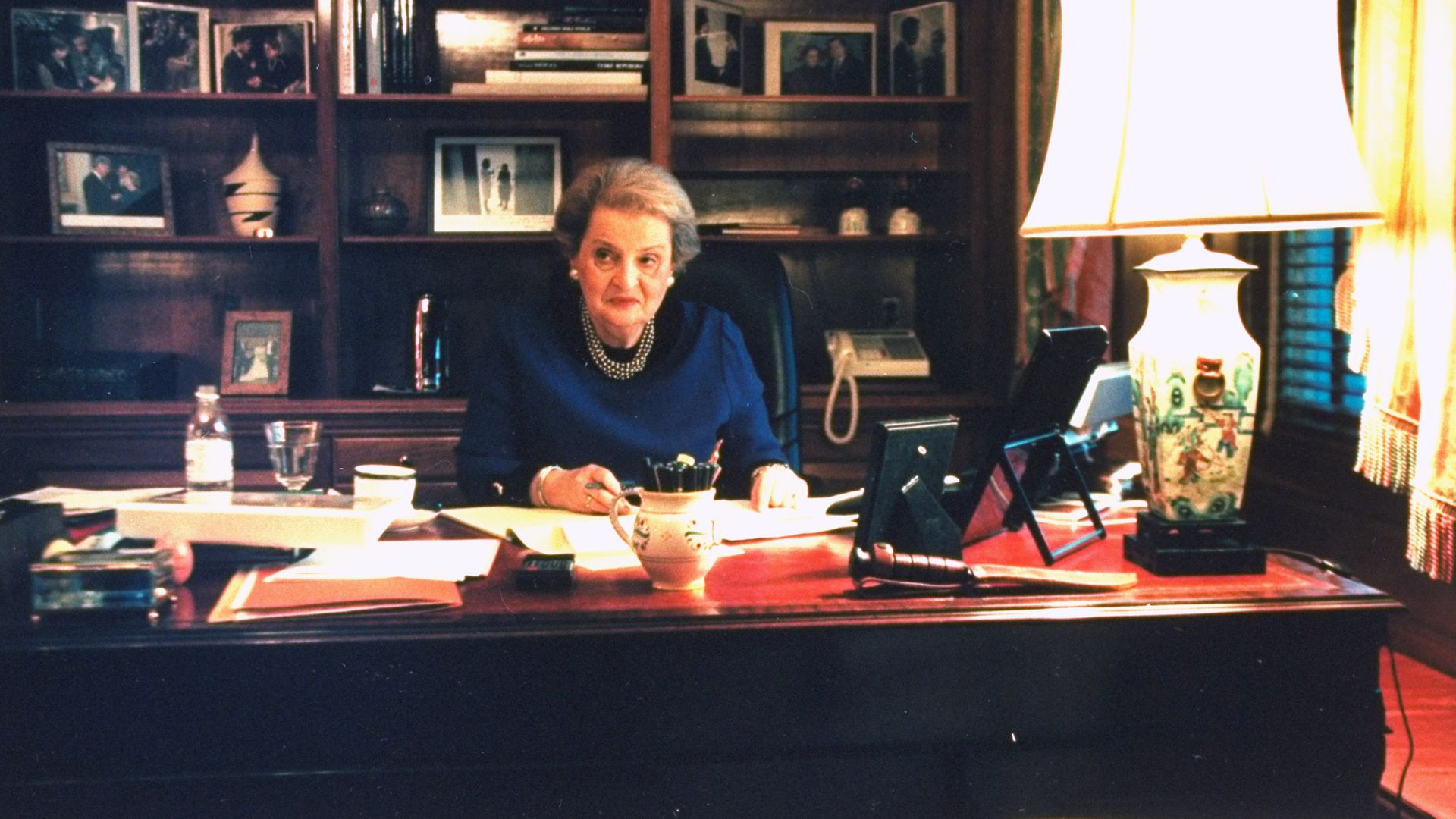 | | | Secretary Albright at work in 1997. Photo: Dirck Halstead/Getty Images | | | | Madeleine Albright came to the U.S. as a refugee when she was 11, a foundational experience that she reflected upon often throughout her life and would provide a guidepost for her work and her legacy, writes Axios' Jennifer Koons, whose book about women in diplomacy will be published next year. Her upbringing between two worlds ultimately made her at home anywhere in the world. - "One of the first steps she made as secretary was ... to go to the refugee camps in Pakistan where the Afghans had fled to because of the Taliban," Ambassador Melanne Verveer recounted to Axios. "She promised the women that she would never forget them."
- Albright continued her work on behalf of Afghan women almost up until the moment she died — offering advice over Zoom to Afghanistan's women peace negotiators and approaching individual U.S. lawmakers, said Verveer, who now directs Georgetown's Institute for Women, Peace and Security.
Regina Argenzio, now with the Eurasia Group, was one of Albright's students at Georgetown. - "Our class culminated in an all-day role play with a scenario eerily similar to what we're seeing now; Russia had amassed troops on the Estonian border," she recalls.
- Albright put on a bomber jacket to play the role of president, and everything was going great until Argenzio announced concessions to "appease" the Russians.
- "She cut me off and in front of the whole room said, 'Don't ever use the word appeasement again.' I was mortified. But my TA later told me that Professor Albright said I was the best White House chief of staff she had seen in all her years of teaching, at which point I left the classroom and burst into happy tears."
The first woman to serve as America's chief diplomat, Albright leaves behind a legion of fellow diplomats who felt welcomed by her into the foreign policy world. |     | | | | | | 7. Stories we're watching |  | | | Window washers in Guiyang, China. Photo: Ou Dongqu/Xinhua via Getty | | | - Taliban suddenly backtrack on pledge to open schools for girls
- New dominant pandemic variant
- Navalny sentenced to nine years in prison
- What counts as a war crime
- Egyptian, Israeli and Emirati leaders hold unprecedented summit
- Assad's UAE visit blindsided the U.S.
- Netanyahu attends testimony of key witness in corruption trial
Quoted: "Not only G20, many organizations are trying to expel Russia ... the reaction of the West is absolutely disproportional." — Russia's ambassador to Indonesia, revealing that Putin plans to attend the G20 summit there later this year. |     | | | | | | A message from Axios | | Recruit top talent with Axios | | |  | | | | Axios now has job boards in the fastest growing cities in America. Reach smart professionals that use Axios daily to make decisions about where to work, what to do and where to live. Post your job opening on Axios | | |  | It's called Smart Brevity®. Over 200 orgs use it — in a tool called Axios HQ — to drive productivity with clearer workplace communications. | | | | | | Axios thanks our partners for supporting our newsletters. If you're interested in advertising, learn more here.
Sponsorship has no influence on editorial content. Axios, 3100 Clarendon Blvd, Suite 1300, Arlington VA 22201 | | | You received this email because you signed up for newsletters from Axios.
Change your preferences or unsubscribe here. | | | Was this email forwarded to you?
Sign up now to get Axios in your inbox. | | | | Follow Axios on social media:    | | | | | |








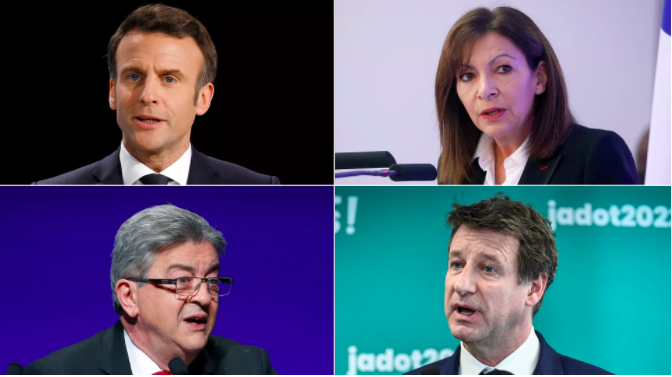



No comments:
Post a Comment